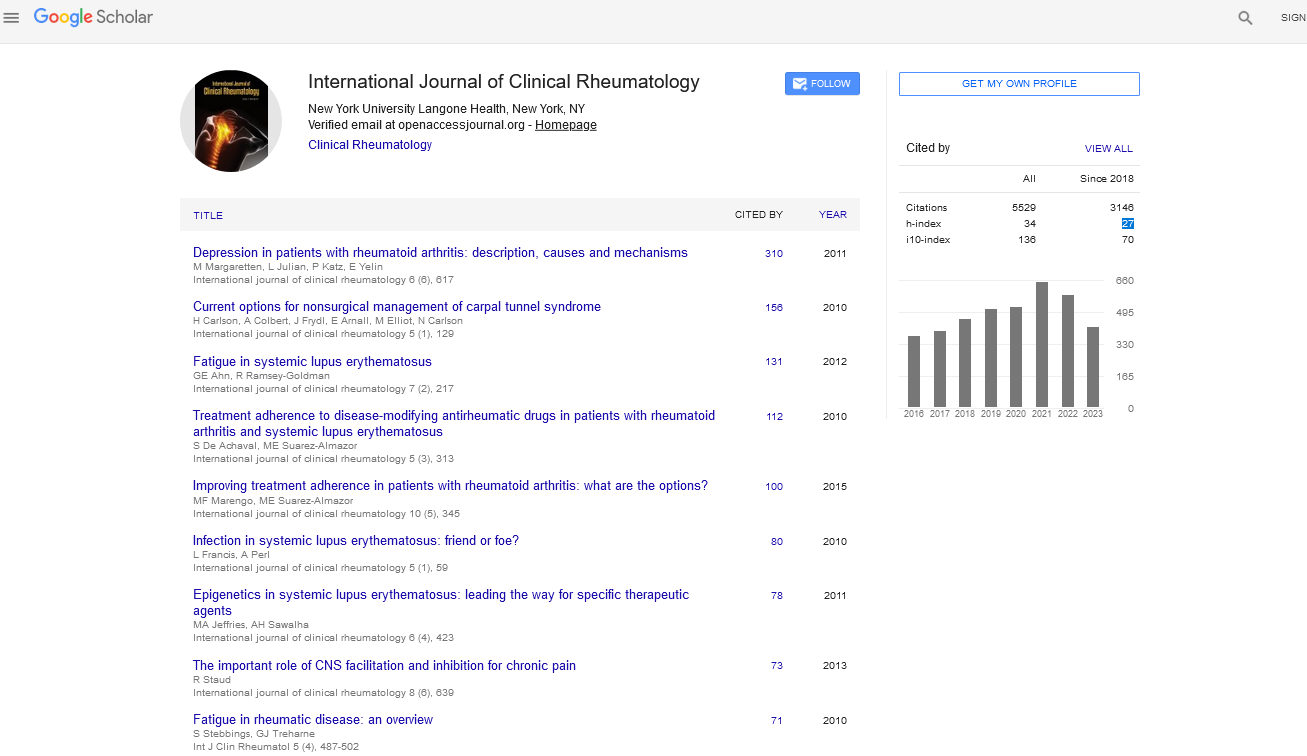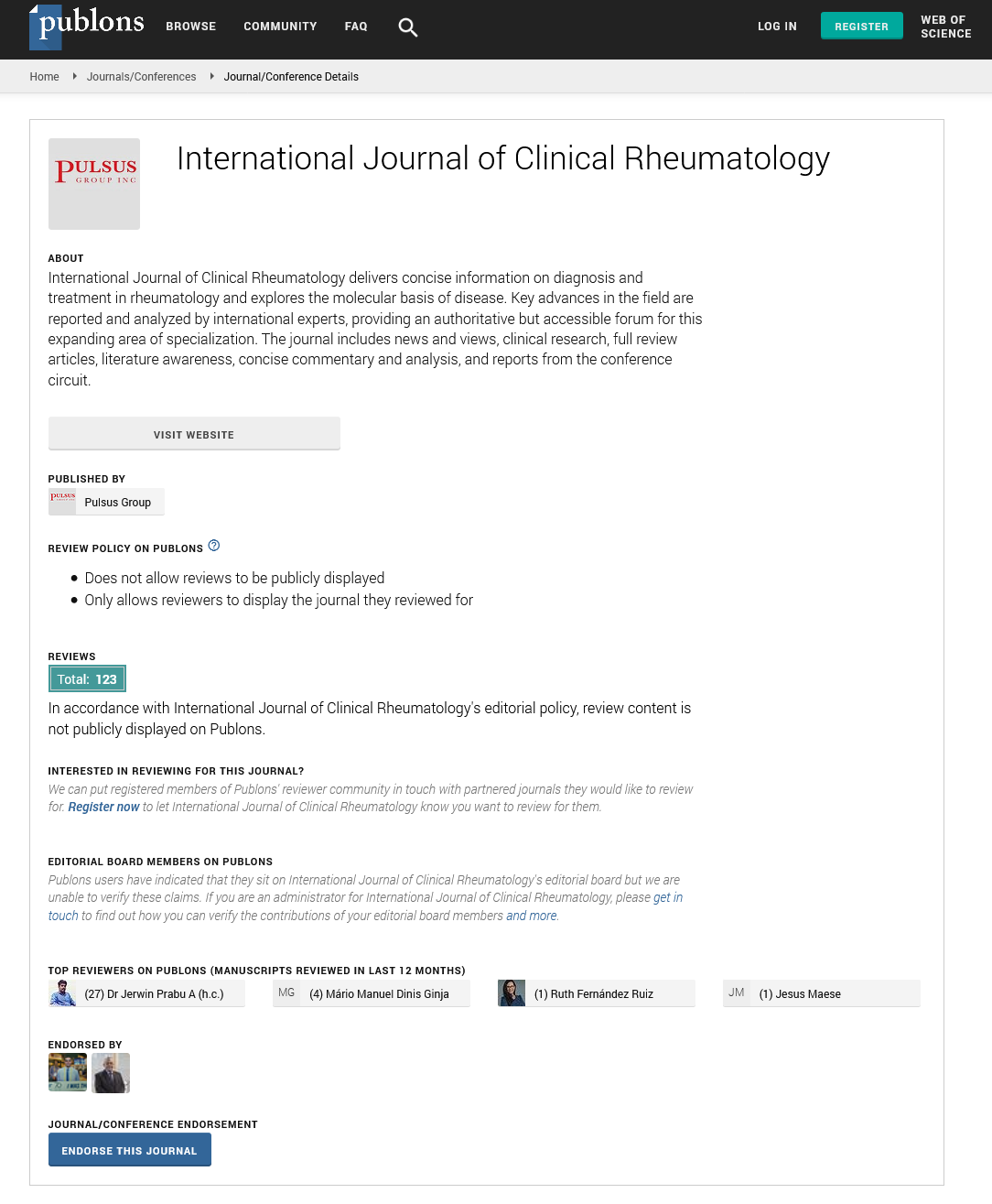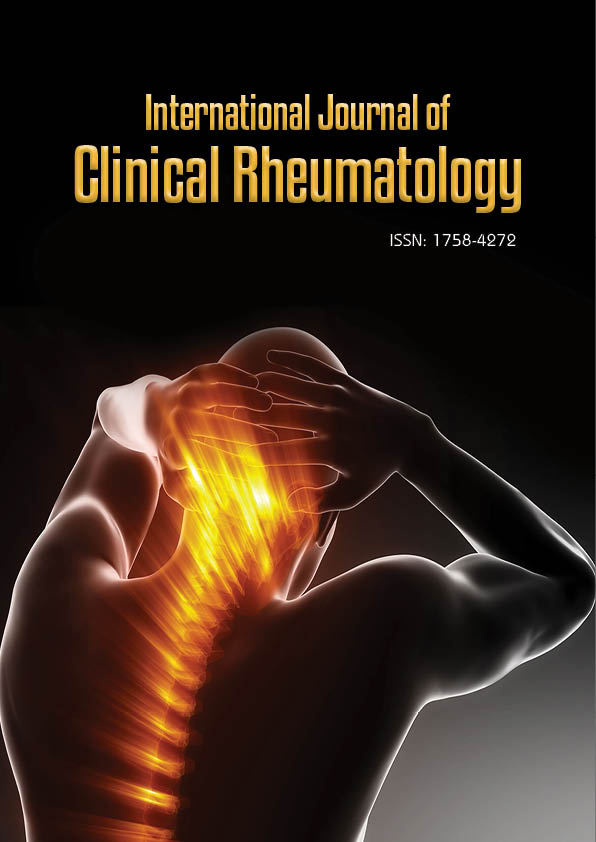Opinion Article - International Journal of Clinical Rheumatology (2024) Volume 19, Issue 11
The Influence of Gender and Hormonal Factors on Disease Severity in Systemic Sclerosis: A Prospective Study
Ethan White*
Rheumatology and Rehabilitation Department, Cairo University, Cairo, Egypt
- *Corresponding Author:
- Ethan White
Rheumatology and Rehabilitation Department, Cairo University, Cairo, Egypt
E-mail: ethan.white77@aol.com
Received: 02-Nov-2024, Manuscript No. fmijcr-25-157435; Editor assigned: 04- Nov-2024, Pre-QC No. fmijcr-25-157435 (PQ); Reviewed: 18-Nov-2024, QC No. fmijcr-25-157435; Revised: 23-Nov- 2024, Manuscript No. fmijcr-25-157435 (R); Published: 30-Nov-2024, DOI: 10.37532/1758-4272.2024.19(11).328-331
Abstract
Systemic sclerosis (SSc) is a rare but serious autoimmune disease characterized by skin and internal organ fibrosis. Epidemiological studies suggest that women are more frequently affected by SSc, and disease severity often varies with hormonal status. This prospective cohort study investigates the impact of gender and hormonal factors, such as estrogen and testosterone levels, on the disease course and severity of SSc. Our findings reveal that women, particularly those of childbearing age, experience more severe skin and organ involvement, potentially exacerbated by hormonal fluctuations. The study suggests that hormonal therapies could play a role in modulating disease progression and improving outcomes in female patients with SSc.
Keywords
Systemic sclerosis● Gender differences● Hormonal factors● Disease severity● Fibrosis● Autoimmune diseases● Estrogen● Testosterone
Introduction
Systemic sclerosis (SSc), also known as scleroderma, is a rare, complex, and multifactorial autoimmune disease characterized by progressive fibrosis of the skin and internal organs, along with vasculopathy and immune dysregulation. The disease can lead to significant morbidity and mortality due to complications such as pulmonary fibrosis, pulmonary hypertension, and renal crisis. The pathogenesis of systemic sclerosis is not fully understood, but it is thought to involve a combination of genetic susceptibility, environmental factors, and immune dysregulation. SSc has a well-documented gender disparity, with women being affected more frequently than men. The ratio of women to men affected by SSc is approximately 4:1, which suggests that gender, and specifically hormonal factors, play a critical role in the disease's development and progression. Estrogen, progesterone, and other sex hormones have been implicated in modulating immune responses, fibrosis, and vascular changes seen in systemic sclerosis [1]. However, the exact mechanisms by which gender and hormones influence the severity of the disease remain unclear, and few studies have directly investigated the impact of gender and hormonal factors on disease severity in a prospective cohort of patients. This study aims to explore the influence of gender and hormonal factors on disease severity in systemic sclerosis. By prospectively following a cohort of patients, we seek to understand how hormonal changes, such as those associated with menstruation, pregnancy, and menopause, influence disease course and severity. Furthermore, we aim to elucidate whether gender-related differences in clinical presentation, organ involvement, and disease outcomes are mediated by hormonal factors [2].
Discussion
Gender Differences in the Prevalence and Clinical Manifestation of Systemic Sclerosis
The observation that systemic sclerosis predominantly affects women has been widely reported, with a female-to-male ratio of around 4:1. This disparity suggests a significant role for gender in the pathogenesis of the disease, but the underlying mechanisms remain elusive. Several studies have suggested that estrogen and other female sex hormones may have a direct or indirect role in enhancing immune responses that contribute to the autoimmune process in systemic sclerosis. These hormones may influence both the innate and adaptive immune systems, contributing to the overproduction of cytokines and collagen, which are central to the fibrosis seen in SSc. In contrast, men with systemic sclerosis generally present with more severe disease and worse outcomes. Men are more likely to develop certain complications such as pulmonary fibrosis, renal crisis, and gastrointestinal involvement, which may contribute to higher mortality rates compared to women. These differences in disease severity between men and women highlight the need for further investigation into how gender and hormones impact disease progression [3].
Hormonal Factors and Disease Severity
Hormonal changes in women, particularly those related to menstruation, pregnancy, and menopause, are thought to influence the severity of systemic sclerosis. Many studies have explored the role of estrogen, which is known to modulate immune cell activity and collagen synthesis. Estrogen has been shown to enhance immune responses by stimulating B-cell proliferation and increasing the production of autoantibodies, both of which are central to the pathogenesis of autoimmune diseases like systemic sclerosis. During pregnancy, women with systemic sclerosis often experience changes in disease activity, although the effect can be variable. Some women report improvement in disease symptoms during pregnancy, particularly in the early stages, while others may experience exacerbations, particularly in the third trimester. This variability could be due to the complex interplay between hormonal fluctuations, immune regulation, and the underlying pathophysiology of the disease. Pregnancy-induced immunologic changes, such as a shift toward a Th2-type immune response, could contribute to disease improvement or worsening depending on the individual patient’s immune profile. The transition to menopause is another important hormonal phase in women with systemic sclerosis. Menopause leads to a decline in estrogen levels, which may alter immune function and impact the progression of fibrosis. Some studies suggest that the postmenopausal period may be associated with worsening disease severity, possibly due to the loss of estrogen’s immunomodulatory effects. Additionally, the decreased estrogen levels after menopause could result in increased collagen deposition, contributing to the fibrosis seen in systemic sclerosis. However, the relationship between menopause and disease severity remains poorly defined, and more prospective studies are needed to assess the long-term impact of hormonal changes on disease outcomes [4].
Gender-Specific Organ Involvement in Systemic Sclerosis
Systemic sclerosis affects a wide range of organs, including the skin, lungs, heart, kidneys, and gastrointestinal tract. While the disease course and organ involvement can be variable, certain gender differences in organ manifestation have been observed. For instance, women with SSc tend to present with more skin involvement, which is a hallmark of the disease. Skin thickening and fibrosis, characteristic of systemic sclerosis, often occur earlier in women than in men. In contrast, men with systemic sclerosis are more likely to develop severe pulmonary fibrosis and pulmonary hypertension, conditions that are strongly associated with poor prognosis and higher mortality.
The gastrointestinal tract is another organ system in which gender differences have been observed. Women with systemic sclerosis are more likely to experience gastrointestinal involvement, including dysphagia, gastroesophageal reflux disease (GERD), and delayed gastric emptying. While men can also experience gastrointestinal symptoms, these tend to be less frequent and severe compared to women. This discrepancy may be due, in part, to the effects of estrogen and other hormones on the smooth muscle function of the gastrointestinal tract. Renal involvement in systemic sclerosis is a critical determinant of morbidity and mortality, particularly in men. SSc-related renal crisis, characterized by severe hypertension and acute renal failure, is more common in men than in women, contributing to the higher mortality rate seen in male patients. This gender difference in renal involvement could be linked to hormonal factors that affect vascular tone and blood pressure regulation [5].
The Role of Hormonal Therapy and Disease Modulation
Given the potential role of estrogen and other hormonal factors in modulating disease activity, hormonal therapy could be a consideration in the management of systemic sclerosis, particularly for women. Hormone replacement therapy (HRT), commonly used to manage menopausal symptoms, has been studied for its potential to modify disease severity in autoimmune conditions. In systemic sclerosis, the effect of HRT is still unclear, with some studies suggesting that estrogen may have a beneficial effect on skin fibrosis and vascular function, while others have raised concerns about the potential risks of exacerbating the disease or increasing the risk of malignancies. Similarly, the use of immunosuppressive agents and biologics in women may differ depending on hormonal status. For example, pregnancy, with its associated immunologic changes, requires careful consideration when initiating or adjusting treatment. Certain immunosuppressive drugs may be contraindicated during pregnancy due to their teratogenic effects, whereas others, such as corticosteroids, may be used cautiously for managing acute flares [6].
Conclusion
Systemic sclerosis is a complex autoimmune disease with significant gender differences in both prevalence and disease severity. Women are more commonly affected by the disease, and hormonal factors such as estrogen play an important role in modulating immune responses and fibrosis. While women may experience more skin involvement and less severe internal organ involvement compared to men, they are also susceptible to disease fluctuations during pregnancy and menopause. Men, on the other hand, tend to have more severe pulmonary, renal, and gastrointestinal involvement, contributing to a worse prognosis. Hormonal changes during menstruation, pregnancy, and menopause are significant factors that may influence disease activity and progression in women with systemic sclerosis. Further prospective studies are needed to clarify the exact role of hormones in modulating disease severity and to develop tailored treatment strategies that account for hormonal influences. Understanding the intricate relationship between gender, hormones, and disease outcomes in systemic sclerosis could lead to more personalized and effective management strategies for both male and female patients.
References
- Jafari F, Hamidian M, Rezadehbashi M, Doyle M, Salmanzadeh-Ahrabi S, et al. (2009) Prevalence and antimicrobial resistance of diarrheagenic Escherichia coli and Shigella species associated with acute diarrhea in Tehran, Iran. Can J Infect Dis Med Microbiol 20: 56–62.
- Ranjbar R, Behnood V, Memariani H, Najafi A, Moghbeli M, et al. (2016) Molecular characterisation of quinolone-resistant Shigella strains isolated in Tehran, Iran. J Glob Antimicrob Resist 5: 26–30.
- Zamanlou S, Ahangarzadeh Rezaee M, Aghazadeh M, Ghotaslou R, et al. (2018) Characterization of integrons, extended-spectrum β-lactamases, AmpC cephalosporinase, quinolone resistance, and molecular typing of Shigella spp. Infect Dis 50: 616–624.
- Varghese S, Aggarwal A (2011) Extended spectrum beta-lactamase production in Shigella isolates-A matter of concern. Indian J Med Microbiol 29: 76.
- Peirano G, Agersø Y, Aarestrup FM, Dos Prazeres Rodrigues D (2005) Occurrence of integrons and resistance genes among sulphonamide-resistant Shigella spp. from Brazil. J Antimicrob Chemother 55: 301–305.
- Kang HY, Jeong YS, Oh JY, Tae SH, Choi CH, et al. (2005) Characterization of antimicrobial resistance and class 1 integrons found in Escherichia coli isolates from humans and animals in Korea. J Antimicrob Chemother 55: 639-644.
Indexed at, Google Scholar, Crossref
Indexed at, Google Scholar, Crossref
Indexed at, Google Scholar, Crossref
Indexed at, Google Scholar, Crossref
Indexed at, Google Scholar, Crossref


